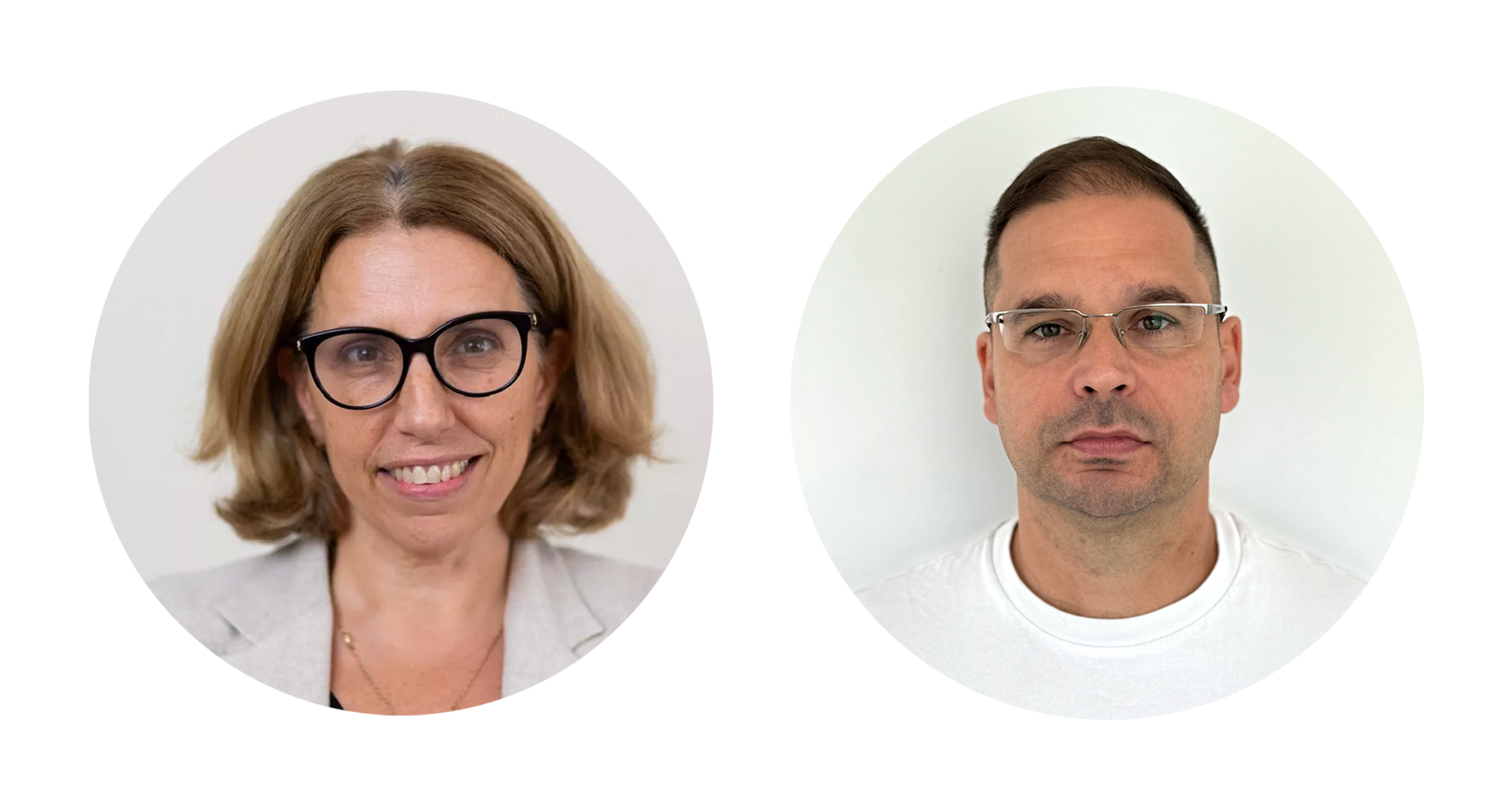
Sep 23, 2024
We are delighted to let you know that the General Assembly in June elected Hariklia Proios as our President for a second term. Hrvoje Jurlina was elected as our new Vice President. Congratulations!
Read what their ambitions are for the coming years.
Hariklia Proios, SAFE President
What is your background?
I’ve spent the last 25 years of my life working to support people affected by stroke, something that has taken me across both the U.S. and Europe. My background is in speech-language, and I am a professor at the University of Macedonia and recently I am also at the CSD department at Adelphi University in New York.
The most rewarding part has been creating and running support groups wherever I go. It’s been such a privilege to work with people from all walks of life, helping them navigate the challenges that come with life after a stroke. I’ve also had the honour of serving as President of SAFE for the past three years. Working with our incredible team to advocate for stroke survivors has been a really rewarding experience.
What is your vision for the future of SAFE?
Looking ahead, my vision for SAFE is simple: I want to keep fighting for stroke survivors. My goal is to ensure that no matter where they live or what resources they have, every stroke survivor gets the care, support and respect they deserve. The disparities in stroke care across different European countries are heartbreaking – some places provide incredible support, while in others, people are left to navigate recovery on their own. That’s something I’m determined to work to change.
We have already made great strides towards this with our work on the Stroke Action Plan for Europe and our Life After Stroke Forum. In the next chapter, we need to build on this work with our member stroke support organisations, working together to deliver campaigns, advocacy, research and raising awareness.
Hrvoje Jurlina, SAFE Vice President
What is your background?
I am a doctor of Family Medicine at a Community Health Centre in Zagreb. My professional journey took a profound turn ten years ago when, at the age of 39, I experienced a stroke at work. That moment became a catalyst for my commitment to improving the needs of stroke survivors, as well as the needs of their families and caregivers.
Five years later, my father suffered a massive stroke and I became his primary caregiver until his passing ten months later. This experience reshaped my perspective on stroke, not just as a survivor, but as someone who intimately understands the emotional, physical and logistical challenges faced by caregivers.
I was recently appointed as Vice President of SAFE and serve as Second Vice President of the Croatian Stroke Society. These roles allow me to merge my personal experiences with my professional expertise, offering a unique, three-dimensional perspective on stroke care and advocacy.
What is your vision for the future of SAFE?
My vision for the future of SAFE is to continue being the strong voice for stroke survivors, advocating for improvements within healthcare systems to ensure comprehensive recovery. We aim to educate about care options and empower stroke survivors and their families by advocating for their rights. SAFE holds a unique position with our ability to unite all the key players, healthcare providers, social services, patient advocate groups, and the families of stroke survivors, into a coordinated and collaborative approach to post-stroke care. I believe that with continued advocacy and collaboration, we can create a healthcare environment that supports stroke survivors through every stage of recovery, offering them not just survival, but a meaningful quality of life.
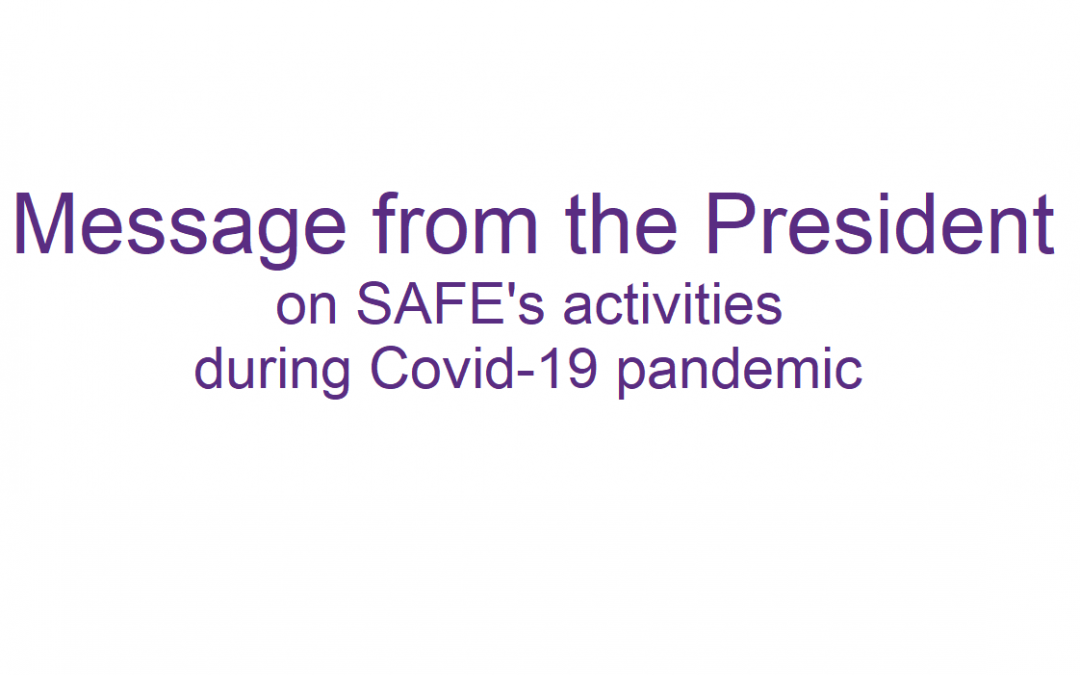
Oct 21, 2020
Dear Friends,
We are in very difficult times. We have never seen a pandemic like this affecting our everyday lives. I hope you and your loved ones are safe and well. We want to let you know that SAFE is here for you and continuing to work despite all the problems around.
While COVID 19 is at the forefront of our thinking, stroke still exists. We know that many of you will be at the front line of services and will be seeing the impact of COVID on individuals who have suffered from stroke. We want to hear from you, we want to know what is happening to stroke survivors in your country, we want to know what is happening to your stroke support organisations and we want to know your ideas as to how we can help.
In addition to finding out how COVID 19 is affecting you and your country, SAFE has adapted its work for 2020. Unfortunately, we have not been able to meet with our members through our usual regional meetings, but we have managed to been up, virtually, June and we will again in November. We have delayed the launch of our economic burden of stroke report until November year. The SAFE General Assembly will be held in November this year and we will do this virtually as we are not able to gather you together for a face to face meeting. I am also excited to let you know that that our first European life after stroke forum is going virtual! The date of 12 March 2021 remains the same and we will share more information with you over the coming months. We will fund one representative from your SSO, and one therapist or nurse from your country. The conference will also be open generally to delegates interested in improving life after stroke services. More information, please click here.
What is happening in the world is a lot for everyone to take in just now, and everyone is having to rapidly adapt their lives on a daily basis. I would like to thank all of you for all the exceptional work you are doing. Please continue to keep well and be safe, do what you can to ensure the survival and sustainability of your stroke support organisation, and we hope to hear from you soon.
With best wishes,
Jon Barrick
President
On behalf of the Board of SAFE
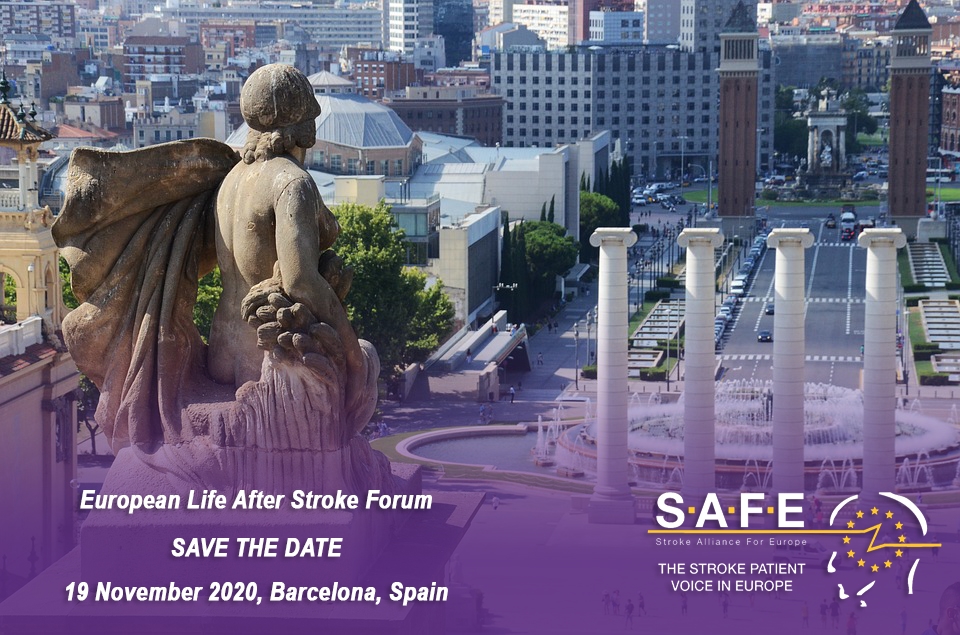
Feb 20, 2020
Life after stroke is a key priority within SAFE’s strategy. It is our pleasure to share with you the date of the first European Life After Stroke Forum – the 19 November 2020 in Barcelona, Spain.
This first European Life After Stroke Forum is driven by the need to implement the Stroke Action Plan for Europe and to create a network of stakeholders involved in professionally researching, advocating and providing evidence for improved life after stroke care.
SAVE THE DATE – EUROPEAN LIFE AFTER STROKE FORUM, 19 NOVEMBER 2020, BARCELONA, SPAIN
We hope we could get you to support the European Life After Stroke Forum by sharing this information with people you know.
When? 19 November 2020
Where? Hotel Catalonia Barcelona Plaza, Barcelona, Spain
Who can attend? Organisations and individuals who operate in the life after stroke area and are research, policy, advocacy or support oriented.
How to register? The registration link will be available soon. Stay tuned!
Please put this date in your calendar and stay tuned for more information that will follow.
We hope to welcome you to Barcelona,
SAFE team
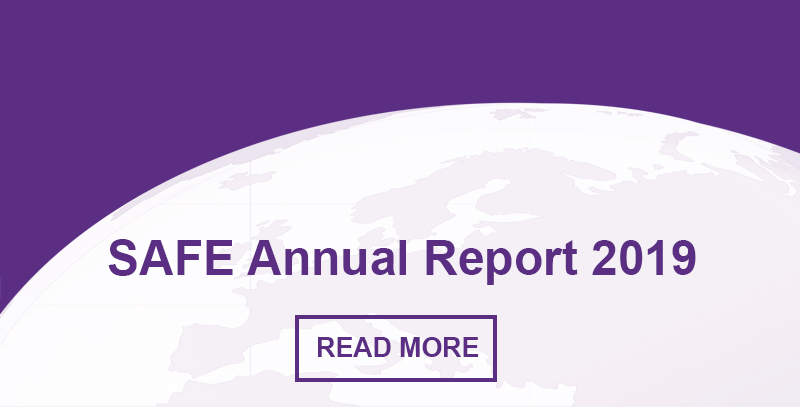
Jan 5, 2020
You can access and download the SAFE Annual Report by clicking on this button below
SAFE Annual Report 2019
In addition, please see below the message of the President of SAFE, Jon Barrick:
This has been a busy and exciting year for our organisation, especially in terms of advocating on pan-European level. We have continued work around the Stroke Action Plan for Europe, forming an implementation committee with the European Stroke Organisation. We held a seminal event at the EU Parliament raising the profile of stroke more than ever before, engaging with the Deputy Director General of the EU’s DG Sante and the EU Committee of the Regions. Through our funding of Oxford University’s project on the economic impact of stroke, we have produced up to date and compelling evidence about the cost of stroke in Europe. With all this accomplished, we continue to press ahead, as we have now completed the third and final year of the research which will provide us with vital European and country specific data on the future economic impact of stroke and power of interventions. The Economic Impact of Stroke in Europe report will be launched in full at the Joint World Stroke Organisation/European Stroke Organisation conference in Vienna in May 2020.
We have continued with the Angels project to produce vital information booklets on stroke to distribute to patients and families while in hospital. We have provided this information in 15 different languages to ensure that more people across Europe can use our materials to improve the lives of stroke survivors.
We continue our educational work with those who wish to understand stroke support organisations and become advocates for better care through our online teaching and learning tool SSOFT, and our regional and working conferences. A particular highlight for me in 2019 was the concrete evidence of the value of our partnership orientation, our Industry partners have been very supportive again, our outreach to ESO has been reciprocated, and we continue to see the number of SSO’s grow, and then become members of SAFE. Yet again we go into a new year with record membership which bodes well for the future.
As SAFE goes from strength to strength in activities to reduce the number and effects of strokes, the Board must also ensure the long-term sustainability of SAFE. The Board has achieved much of its work through dedicated voluntary time but has recognised that this needs to be added to by full
time paid staff. The Board agreed that SAFE required more permanent leadership to drive forward and to achieve our goals. I am delighted to let you know that we recruited our first Director General this year and I know you will all join me in welcoming Arlene Wilkie into the SAFE family.
In 2019, we have been able to deliver many significant achievements because of our close working community. I would like to thank those that have worked with and for SAFE this year, and to the members and sponsors who have supported us practically and financially. This next year is my last as President and I am looking forward to ensuring we have a solid 2020 of achievement to strengthen the long-term sustainability of all stroke support organisations in Europe.
Jon Barrick
SAFE President

Aug 23, 2019
SAFE is very pleased to announce the new Director General, Arlene Wilkie, commenced in post on the 12th August, leading and overseeing the delivery of all SAFE activity and projects, working with our existing experienced team of Jelena Misita, Communications Manager, Gary Randall, SAFE European Research Officer, Lucinda Shaw, Partnerships Manager and Sandra Jackson, Secretariat.
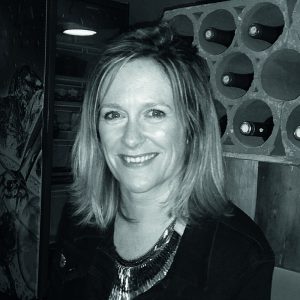
Arlene Wilkie, SAFE Director General
Arlene Wilkie, the new Director General, comes with a wealth of experience and expertise, derived from a variety of organisations and roles over the last twenty years in the healthcare sector, primarily in patient focused organisations. These include Director of Research and Policy at Breast Cancer Campaign, Chief Executive of the Neurological Alliance (a membership organisation of 70 neurological organisations in England), Chief Executive of The Migraine Trust, and Interim Director of Services and Influencing at the Brain Tumour Charity UK.
“I am so pleased to have joined SAFE. In the brief time I have been within here I have been so impressed by the passion of the staff and the board, and their determination to see a reduction in the number of strokes in Europe and the impact they have on peoples lives. I will strive to raise the profile of stroke and stroke survivors and ensure all is done to achieve the stroke action plan for Europe. I am also really looking forward to getting to know and working with all our supporters and members.” said Arlene.
One of Arlene’s great strengths is alliance building, particularly around policy development and implementation, and in her role she will be co-chairing the implementation committee of the Stroke Action Plan for Europe, and playing a leading role in our partnership group. Arlene can be contacted at arlene.wilkie@safestroke.eu
“SAFE has been through a very thorough recruitment process, and from over 130 initial candidates we are thrilled that Arlene has agreed to join us. Her track record is very impressive and over the next few years with the need to ensure sustainability of SAFE whilst pursuing important objectives such as the Stroke Action Plan for Europe and the strengthening of stroke associations in each country of Europe we know we will benefit from her leadership. The appointment of a Director General is a bold step and demonstrates SAFE’s belief that stroke care and the needs of stroke survivors must be pushed higher up the agenda.” stressed Jon Barrick, SAFE President.

Feb 13, 2018
Written by Sarah Belson, published on worldstrokeorganization.blogspot.com
We want to make sure that the voices of people affected by stroke are heard throughout the Congress in an exhibition of stroke survivor, family and caregiver testimonials.
The 11th World Stroke Congress will focus on the latest developments in stroke prevention, acute management and restorative care after stroke. Reducing the burden of stroke on people with lived experience and their family and care givers drives everything the World Stroke Organization does.
In previous years the visibility of people with lived experience of stroke has been promoted through art exhibitions, both physical and online, and a hobbies ebook. (more…)

Jul 3, 2025
Join Global Leaders in Stroke Care at WSC 2025 in Barcelona
The World Stroke Congress (WSC) 2025, set to take place on October 22-24, 2025, in the vibrant city of Barcelona, marks a significant milestone for the stroke community.
For the first time in over 15 years, the congress will return to Europe, providing an opportunity to advance the global conversation on stroke prevention, treatment and rehabilitation.
This historic event brings together leading professionals, researchers, clinicians, policymakers and individuals with lived experience to collaborate on shaping the future of stroke care.
A Platform for Global Collaboration and Innovation
WSC 2025 offer a program designed to immerse attendees in the latest scientific breakthroughs and the most pressing issues in stroke research and treatment. From the frontlines of innovation to cutting-edge science, the congress feature a range of topics including:
- Intracranial Atherosclerotic Disease (ICAD)
- Large Artery Disease
- Cardioembolism
- Cerebral Venous Sinus Thrombosis (CVST)
- Stroke in the Young
- Rehabilitation and Recovery
- Embolic Stroke of Undetermined Source (ESUS)
- Revolutionary Research Methods
- Hyperacute Stroke Treatment Advances
- Neuroimaging Innovations & Intracranial Hemorrhage Management
This year, WSC 2025 has crafted its program based on a deep dive into the most impactful research and groundbreaking publications from leading stroke and neurology journals. Attendees will gain exclusive access to insights and discoveries directly from those shaping the future of stroke care.
Building a Global Movement for Stroke Care
WSC 2025 is an opportunity to engage with trailblazers in the field, discuss current challenges and solutions, and be part of a global movement to transform stroke prevention and treatment.
The congress will place a strong emphasis on global collaboration, advocacy, diversity, equity and inclusion, ensuring that stroke care continues to improve worldwide. One of the key focuses will be providing opportunities for early career investigators to network, receive mentorship and further their professional development in the field of stroke research and clinical practice.
The program for WSC 2025 is now available, and early bird registration is open! Attendees who register by August 5, 2025, can take advantage of special early bird rates.
Register today and be part of this historic event in the fight against stroke: https://worldstrokecongress.org/registration
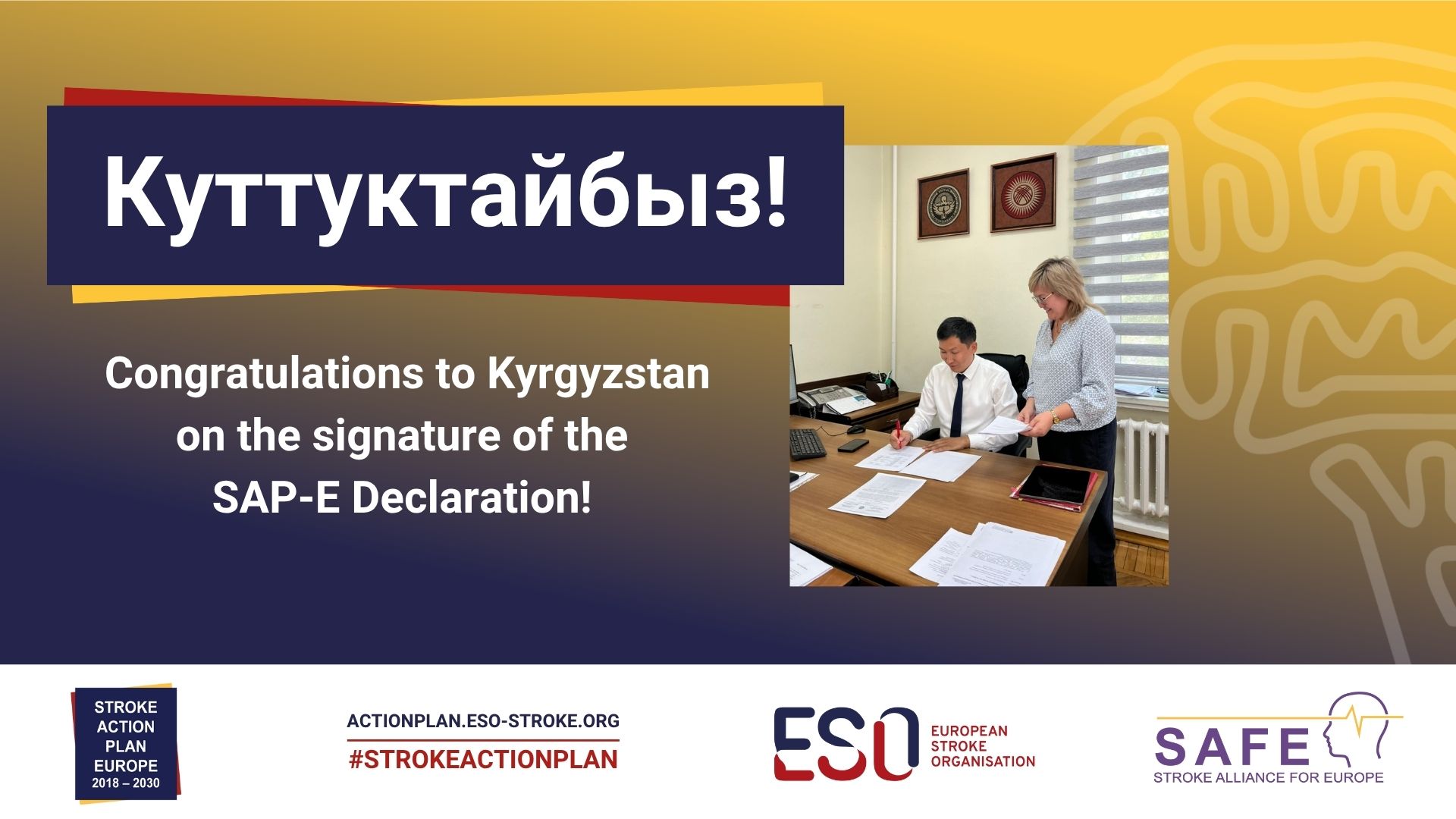
Jul 1, 2025
Congratulations!
Kyrgyzstan is now the 15th country to endorse the Declaration for Action on Stroke, marking a significant step towards improving stroke care, prevention and recovery services for its population.
By signing this declaration, Kyrgyzstan’s government demonstrates its commitment to recognising stroke and other cerebrovascular diseases as leading causes of premature death, long-term disability and cognitive decline among adults. The declaration emphasises that many strokes are both preventable and treatable through evidence-based, cost-effective interventions.
With this endorsement, Kyrgyzstan pledges to fully support the implementation of the Stroke Action Plan for Europe, aligning with its four key targets for 2030 and the broader goals of the WHO Global Action Plan for the Prevention and Control of Noncommunicable Diseases.
Read more here.

Jun 20, 2025
We are pleased to announce that the fourth in-person European Life After Stroke Forum will take place in Stockholm on 9-10 March 2026.
The Forum is a unique event where healthcare professionals, researchers, policymakers and those affected by stroke can come together to address the issues of life after stroke. Our programme will be filled with the latest research, best practice and shared insights with the voices of people with lived experience at its heart.
We are actively seeking abstracts in three categories:
- Scientific – for completed or ongoing research focussed on life after stroke.
- Service development – for innovative service developments in life after stroke that could benefit others.
- Lived experience – for people who have experienced a stroke or those who have supported a loved one through it to share their experiences in creating change.
For more information or to submit an abstract, please click to visit our website.

May 21, 2025
Thank you to all those that came to the European Life After Stroke Forum in Prague on the 10-11 March. We are delighted to have so many of the European Stroke Community come together to continue to improve Life After Stroke. If you were not able to join us in Prague or would like to re-visit the best moments, we have included the links to the post-event materials that are available on our website below.
Click to view event slides
Click to view programme
Click to view scientific and service development abstract book
Click to view lived experience abstract book
Click to view forum report
Click to view photo gallery

May 19, 2025
SAFE meets new EU Health Commissioner to champion cardiovascular health
SAFE was invited to meet with the new EU Health Commissioner, Olivér Várhelyi, as the patient organisation representative of the European Alliance for Cardiovascular Health. During the meeting, the Commissioner outlined his commitment to advancing cardiovascular health (CVH) across the EU and shared plans to develop an EU CVH Plan.
Arlene Wilkie, our Director General, highlighted the importance of secondary prevention, rehabilitation and supporting life after a cardiovascular event – ensuring that the lived experience voice remains central in shaping future policy. We will continue to keep our members informed on the progress of the EU CVH Plan and what it could mean for improving stroke services across member states.
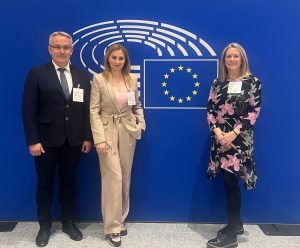
Launch of the MEP Cardiovascular Health Group
SAFE was also pleased to attend the launch of the new MEP Cardiovascular Health Group at the European Parliament in Brussels. Chaired by MEP Romana Jerković (S&D, Croatia), the group met with around 50 delegates from the European Alliance for Cardiovascular Health to discuss the year’s work programme and to mark the launch of a new publication by the Alliance: “A European Cardiovascular Health Plan: The Roadmap.”
Representing SAFE at the event were Arlene Wilkie, our Director General, alongside Liliana Curea from ALIA, Romania, and Adam Siger from Fundacja Udaru Mózgu, Poland. The formation of this dedicated group within the European Parliament represents a significant step forward in driving coordinated EU action to improve cardiovascular health outcomes across member states.
Read more
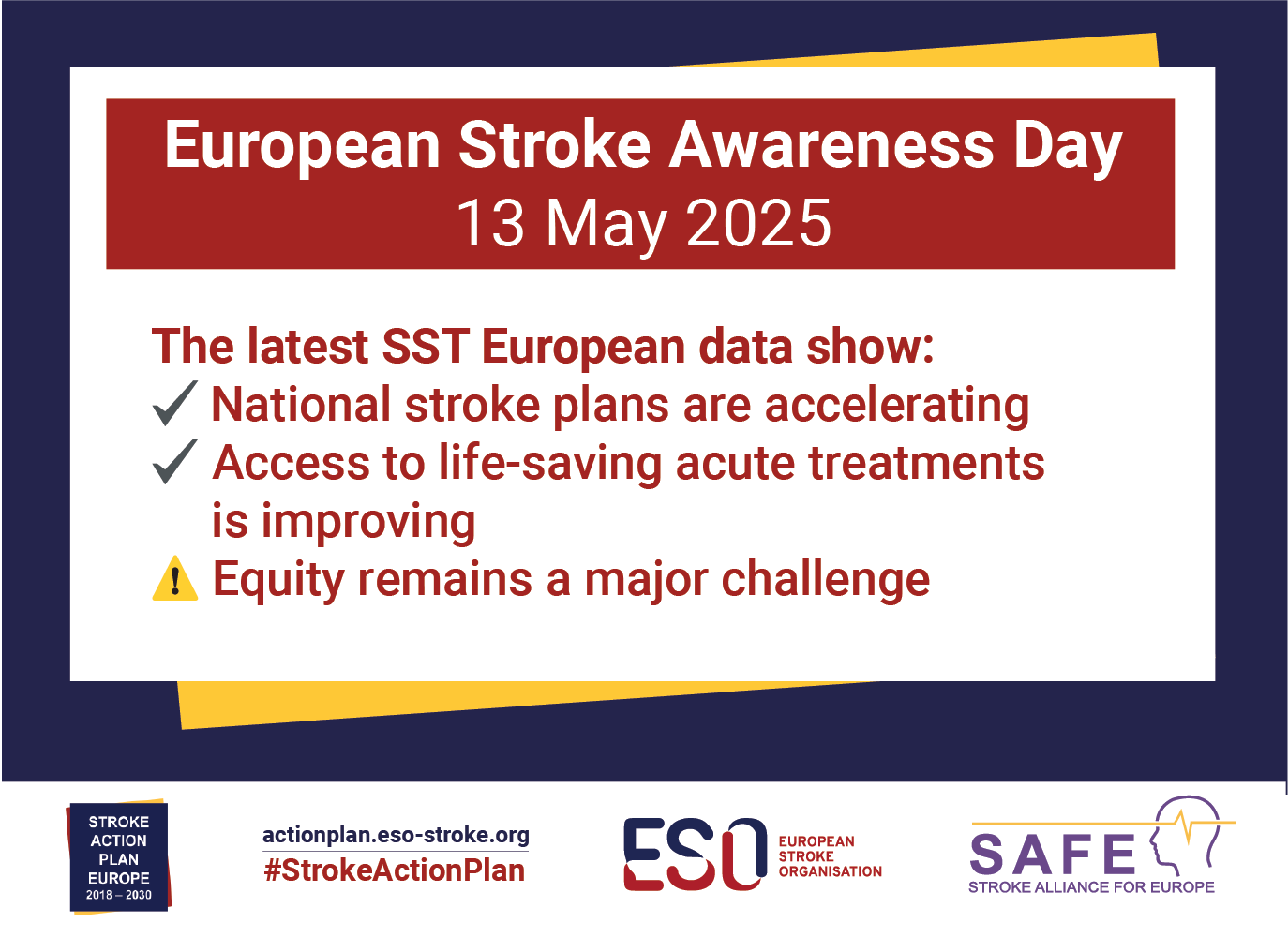
May 13, 2025
The 2023 Stroke Services Tracker data shows progress in stroke care planning and treatment access, but persistent disparities demand urgent attention.
New data from the Stroke Action Plan for Europe’s 2023 Stroke Service Tracker, launched today, show encouraging progress in stroke care across Europe – but also highlight serious inequalities that urgently need to be addressed.
A total of 47 countries contributed to the latest dataset, providing the most comprehensive picture yet of stroke care across the continent. The findings show improvements in national planning, emergency treatment and prevention. However, too many people who have had a stroke still face major challenges in accessing the care, rehabilitation and follow-up they need.
Stronger national commitment to stroke care
There is growing political commitment to tackling stroke. The number of countries with a national stroke plan has risen from 16 in 2022 to 24 in 2023, with 16 more countries currently developing one. Importantly, 30 countries now involve Stroke Support Organisations in shaping national stroke strategies and guidelines, ensuring people with lived experience have a voice in how care is delivered. Lithuania, Poland and Slovakia have recently joined this effort.
Programmes aimed at preventing stroke are also becoming more common. Lithuania, Sweden, the Netherlands and Germany are among the countries that have launched or expanded national prevention efforts in the past year, bringing the total to 23.
Improved access to life-saving treatment – but too slowly
Access to key emergency treatments for ischaemic stroke (which happens when a blood clot or blockage stops blood flow to parts of the brain) is improving, but unevenly. On average, 15.4% of eligible patients received clot-busting drugs (intravenous thrombolysis), and 5.9% underwent mechanical thrombectomy – a procedure to remove a clot directly from the brain.
Seven countries have now met the European benchmark of giving thrombolysis to at least 20% of patients, and 14 have reached the target of delivering thrombectomy to over 7.5%, based on high-quality data. Five more countries hit this goal using data of lower quality.
However, delays in treatment remain a major problem. Only seven countries managed to achieve the recommended ‘door-to-groin’ time – the time from arrival in hospital to starting thrombectomy – of 60 minutes or less. In 12 countries, this delay was over 90 minutes, reducing the chances of a good recovery.
Ongoing challenges in stroke unit care, rehabilitation and follow-up
Despite some progress, the organisation of stroke services and monitoring of quality still fall short in many areas. The goal of admitting at least 90% of stroke patients to a specialist stroke unit is only met in nine countries with reliable data. In contrast, some countries admit fewer than one in four patients to stroke units – and others don’t collect this data at all.
Only 22 countries monitor the quality of stroke unit care. The picture is even more concerning when it comes to rehabilitation after hospital discharge. Just 11 countries have systems in place to monitor the quality of rehabilitation services.
Early rehabilitation is available in stroke units in 22 countries (although data quality is low in eight). However, there has been little progress in ensuring patients have a rehabilitation and care transition plan which are essential for continued recovery. Just five countries systematically monitor whether such plans are given, while 14 estimate that they are provided, but without proper tracking.
Follow-up care after stroke also varies widely. Only 11 countries report that at least 90% of patients receive follow-up and just four countries offer structured follow-up that meets recognised standards.
Prevention of further strokes and improving patient outcomes
Preventing another stroke is crucial – nearly one in four strokes happens in someone who has already had one. But across Europe, there is little data on how well countries are doing in providing secondary prevention, or how many patients are getting the medication and support they need. This makes it difficult for policymakers to know where to act.
These inequalities in care are reflected in outcomes. In some regions, death rates within 30 days of stroke remain worryingly high, pointing to major differences in access to emergency treatment, rehabilitation services and longer-term support.
Life after stroke: support remains limited
Only 13 countries report having a dedicated national programme for life after stroke. While many address important aspects of recovery, support remains inconsistent. Twelve countries include ongoing health management in their programmes, while 10 focus on emotional adjustment and mental wellbeing. Eleven countries offer support for everyday activities and practical challenges, and an equal number provide information and guidance for both stroke survivors and their carers.
A call to action: bridging the gap between potential and practice
“The 2023 Stroke Service Tracker data show that while momentum is building in some areas – particularly in national planning and access to acute therapies – major gaps in organisation, delivery and equity of stroke care persist,” said Professor Hanne Christensen, Chair of the Stroke Action Plan for Europe. “There is no room for complacency. Countries must take these insights and act decisively to bring data collection and stroke care up to the standards that every person affected by stroke deserves.”
Arlene Wilkie, Director General of the Stroke Alliance for Europe (SAFE), added: “It is unacceptable that in 2023 we still see such wide disparities in access to stroke unit care, early rehabilitation and life after stroke support. Stroke survivors need holistic and continuous care. We call on all national governments and policy makers to do better in providing the essential services required for all those affected by stroke.”
Professor Simona Sacco, President of the European Stroke Organisation (ESO), emphasised: “The Stroke Action Plan for Europe provides countries with the framework they need to close the gap between aspiration and delivery. These data are both a roadmap and a challenge – to work smarter, faster and more equitably.”
Click to read more
About SAP-E and the Stroke Service Tracker
The Stroke Action Plan for Europe (SAP-E), launched in 2018, provides a strategic blueprint to improve stroke prevention, care and life after stroke support by 2030. The Stroke Service Tracker (SST) was developed as a monitoring tool to evaluate Europe’s progress against the SAP-E targets, providing valuable insights for national stakeholders to drive improvements.
Europe faces over 1.1 million strokes each year, causing nearly 460,000 deaths. Nearly 10 million people live with stroke’s long-term effects. The economic burden is immense – €60 billion in 2017 – and is projected to rise to €86 billion by 2040 without urgent reform.
The SST continues to be a vital instrument for mapping progress and exposing areas where countries fall short. It is a call for action, innovation and investment to ensure every stroke survivor in Europe has access to high-quality, timely and equitable care – no matter where they live.

Apr 29, 2025
The European Stroke Organisation Conference (ESOC) 2025 will take place in Helsinki, Finland on the 21-23 May. The scientific programme is focussed on:
- Acute ischaemic stroke management
-
Intracranial haemorrhage
-
Recovery, rehabilitation, and outcome
-
Diagnosis / Etiology
-
Risk factors and prevention (primary and secondary)
-
Novel targets: experimental findings to clinical translation
-
Digital transformation, AI and robotics
The medically focussed event will share cutting-edge research and insights in stroke prevention, treatment, diagnosis and rehabilitation.
Click to register
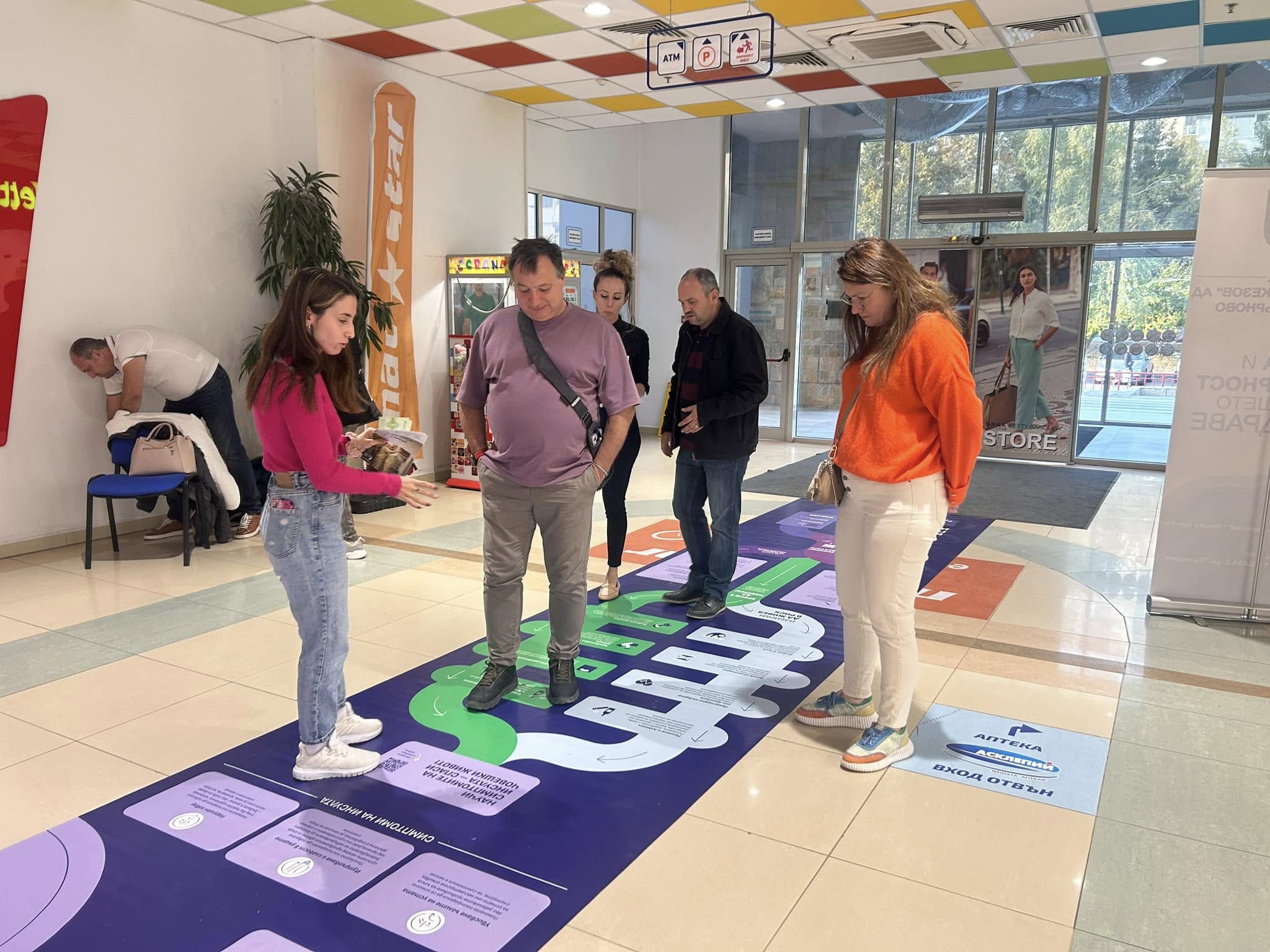
Apr 23, 2025
SAFE met with SAFE board member Dorina Dobreva, founder and chair of the board for Association for Stroke and Aphasia (Bulgaria) and Dr. Georgi Georgiev, Vice President for Association for Stroke and Aphasia, to talk about their 2024 campaign for World Stroke Day
Every year on 29 October, World Stroke Day provides a global spotlight on stroke. For the Association for Stroke and Aphasia (ASA), this annual event is more than a date on the calendar – it is a call to action.
Why ASA chose to join the global movement
Although ASA is still a young organisation, founded in 2020, it sees involvement in international stroke campaigns as a vital responsibility. The team believes that raising awareness and sharing knowledge can make a real difference – even save lives.
“Although we are a relatively new stroke support organisation, we believe that our involvement in international stroke organisations such as the World Stroke Organisation and SAFE is a societal responsibility,” the organisation’s founder and chair of the board Dorina Dobreva explains. “It compels us to work towards enhancing the health skills of everyone in Bulgaria.”
From its inception, ASA has actively participated in World Stroke Day campaigns. For them, joining this global fight is a step toward building a healthier and more hopeful future.
Planning with purpose: setting goals and KPIs
When planning for the campaign, the team examined their stroke statistics in Bulgaria. They were alarmed by the growing number of young people experiencing strokes and the lack of action from policymakers.
“We decided to focus our 2024 campaign on spreading essential knowledge about stroke,” explains Dorina. “Its nature, risk factors, symptoms, and most importantly, how to act when it happens.”
This is where the team saw its greatest potential for impact: by improving public knowledge to help more people recognise stroke symptoms and seek treatment quickly to receive thrombolysis treatment (IVT).
“One proven way to change the pessimistic stroke statistics in Bulgaria is by improving access to IVT stroke treatment and therefore reducing disability as well as the social costs to the country as a whole.”
Key performance indicators included:
- The percentage of ischaemic stroke patients who received IVT (thrombolysis) within the treatment window
- The annual percentage of IVT-eligible patients compared to treatment rates across leading neurological departments
Inside the campaign
The 2024 campaign carried a clear message: “Be Prepared! Recognise The Stroke. Act Fast!”
One of the centrepieces was the “Pathway of knowledge” – a 7-metre interactive installation that gave people a hands-on way to learn about stroke in just minutes. Along the path, QR codes linked to deeper resources. At the end, participants could take a quick online quiz and even snap a selfie in support of the cause.
“Each person who has passed the ‘Pathway of knowledge about stroke’ will have all the information they need to save someone’s life,” says Dr. Georgi Georgiev, the organisation’s Vice President.
Other campaign features included:
- A new Stroke infobot on Viber, offering instant access to stroke information
- A dedicated National support line for stroke survivors and carers
- Multiple educational videos (30 seconds to 2 minutes) shared across TV, social media and public displays
- Consistent campaign visuals aligned with ASA’s brand and global stroke awareness imagery, shared across banners, press releases, and websites
Working with institutions and partners
Another impactful initiative was a series of expert-led events titled “Stroke – A look into the black box.” These national discussions brought together doctors, emergency services, policymakers, media and stroke survivors to map out the full stroke care journey – from the moment symptoms appear to hospital treatment. The message was clear: no one organisation can fix this alone.
“At every meeting, all the experts agreed: the lack of public knowledge is a major issue. It delays emergency calls and transport to stroke centres, costing lives. We need to work together to do better” Georgi explains.
With long-standing support from the Municipality of Sofia, the team achieved two additional important wins:
- Their stroke awareness video would now be displayed year-round, not just twice a year.
- Trams and trolleybuses in Sofia with digital displays showed the video during the World Stroke Day campaign.
Extending activities to the whole of Bulgaria
The campaign was not limited to the capital, activities reached towns and cities across the country, including:
- The “Pathway of knowledge” interactive installation in various public spaces
- Educational videos and visual content shared online and through traditional media
- Print materials, QR code resources and community-led information sessions
Wherever possible, people were encouraged to share photos of themselves at the end of the pathway to show support and spread the message further.
Mobilising volunteers
In 2024, the team faced a challenge – their usual partners at the Red Cross were unavailable to assist during the campaign. Undeterred, the team turned to friends, carers and stroke survivors for help.
“Many people joined us, especially during the ‘Pathway of knowledge’ events,” says Dorina. “Caregivers and medical experts also played a key role in spreading the word.”
The campaign’s national launch, held at Serdika Mall, was opened by ASA’s President and broadcast live on National Television.
What were the results?
Early signs are encouraging. Awareness is growing, more health professionals are taking part, and thousands have already visited the ‘Pathway of knowledge’. The campaign’s coverage is expanding, and public engagement is rising. Still, Dorina acknowledges that some results will take time.
“To truly understand the campaign’s impact, we will need to evaluate data mid-2025. This work will continue for years – but we are committed.”
Why create a campaign report?
ASA believes in transparency, responsibility and continuous learning. Documenting their efforts helps ensure that each campaign builds on the last.
“Achieving remarkable results is vital – but so is the process of getting there,” Georgi explains. “We want to demonstrate our capacity and innovation as a stroke support organisation. But more importantly, we want to stay aligned with values like honour, dignity, and mutual respect.”
Through clear goals, strategic action and a community-driven spirit, the team at ASA continues to push forward – building a stroke-aware Bulgaria, one step at a time.
Click to download the report here.
Contact Dorina to find out more: info@stroke.bg
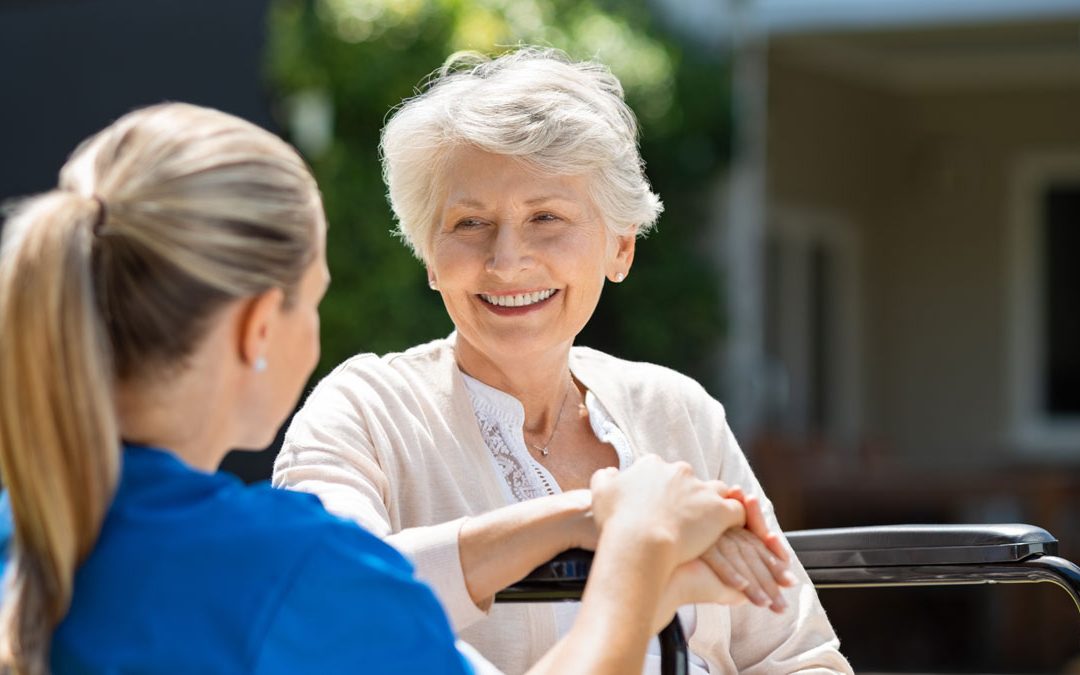
Mar 19, 2025
The Neurological Conditions campaign launched last week during Brain Awareness Week, highlighting the latest innovations in brain health and neurological treatment. This campaign showcases the researchers, healthcare professionals and organisations driving progress in neurology, developing cutting-edge treatments and improving patient outcomes.
At SAFE, we are committed to raising awareness of the challenges stroke survivors face and advocating for better support and rehabilitation across Europe. That’s why we partnered with Mediaplanet on this initiative, ensuring life after stroke remains a key focus in the conversation around neurological care.
Click to read the article by our Director General Arlene Wilkie
Click to read
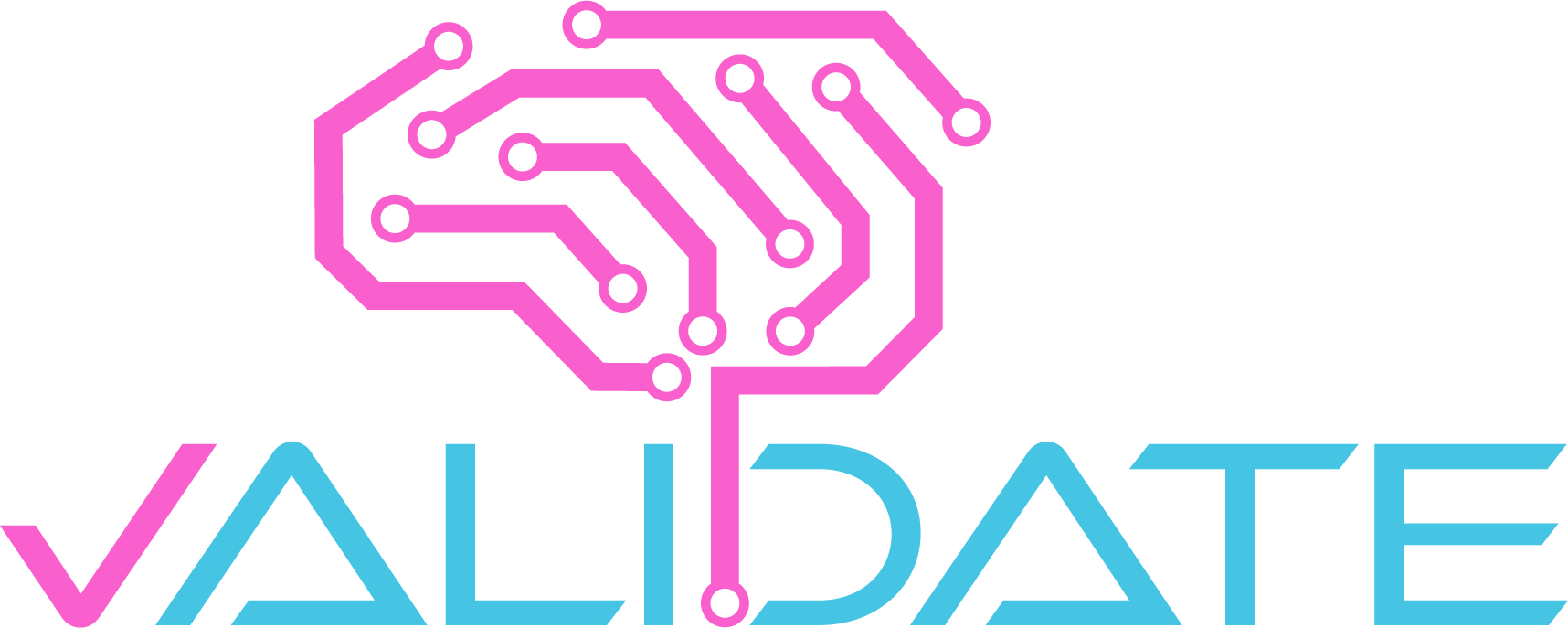
Mar 15, 2025
On Brain Awareness Week’s sixth day we are focusing on Validate, an EU Horizon research project which is using AI to revolutionise stroke treatment by analysing patient data and helping doctors make faster, more informed decisions. A huge part of this project is ensuring that AI is trustworthy, safe, fair and reliable before its widespread hospital use.
AI’s role in stroke treatment
Over one million people in the EU suffer from ischemic strokes each year. Treatments like mechanical thrombectomy (removing the clot) and intravenous thrombolysis (dissolving the clot with medication) can be lifesaving, but their effectiveness varies based on factors like time since the stroke, patient age, health problems and genetics can affect the outcome. VALIDATE is developing an AI tool to help doctors select the best treatment for each patient.
Ensuring AI is Safe and Fair
To make AI a reliable medical tool, VALIDATE focuses on:
- Training AI with diverse data to reduce bias
- Collaborating with doctors, AI experts and patients
- Following EU safety and ethical regulations
- Continuously testing for accuracy and reliability
Dr. Riana Mutua from the Berlin Institute for Health stresses the need for interdisciplinary collaboration:
“Ensuring AI is trustworthy in healthcare requires more than just technical excellence. At VALIDATE, we work closely with doctors, patients and AI developers while following strict ethical and regulatory guidelines. By combining expertise across fields, we will create an AI system that doctors can trust – one that truly benefits patients and leads to more informed treatment decisions.”
Arlene Wilkie, Director General of the Stroke Alliance for Europe (SAFE), highlights the importance of patient involvement:
“It is essential that stroke survivors have a voice in the development of AI tools that will impact their care. Through VALIDATE, we ensure that this technology is designed with both patients and clinicians in mind. AI should not only support doctors in making better decisions but also improve outcomes and quality of life for those affected by stroke.”
By prioritising safety, fairness and patient-centered design, VALIDATE is paving the way for more personalised, effective and trustworthy AI-assisted stroke care.
Click to view video about how Validate makes AI safe
Or click to visit the Validate website

The VALIDATE project receives funding from the European Commission’s Horizon Europe Programme under grant agreement number 101057263.
Page 1 of 7912345...102030...»Last »






















